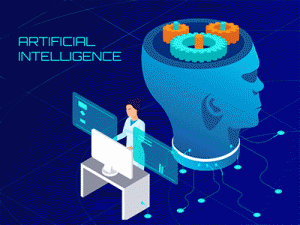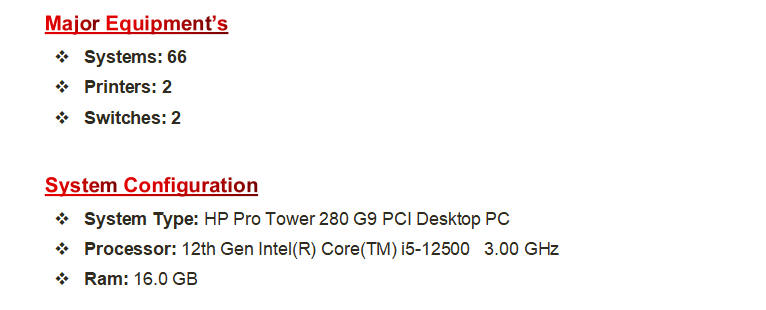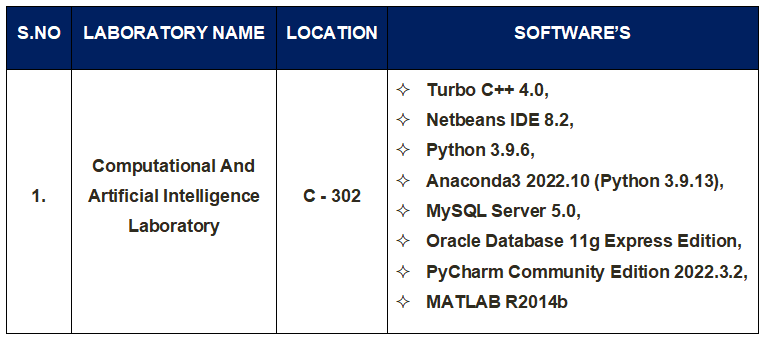Vision:
-> To develop engineers with global employability, entrepreneurship capability, research focus and social responsibility

Vision:
-> To develop engineers with global employability, entrepreneurship capability, research focus and social responsibility
Mission:
-> To develop internationally competent engineers in dynamic IT field by providing state-of-the-art academic environment and industry driven curriculum
-> To motivate and guide students to take up higher studies and establish entrepreneurial ventures
-> To enrich the department through committed and technically sound faculty team with research focus in thrust areas
-> To undertake societal problems and provide solutions through technical innovations and projects in association with the industry, society and professional bodies
|
Department
of CSE (Artificial Intelligence and Machine Learning) |
||||||
|
S.No |
Name |
Qualification |
Designation |
Date of Joining |
Date on which designated
as S.Prof. / Prof. / Asso.Prof. |
Nature of Association
(Regular / Contract / Adjunct) |
|
1 |
Dr.P.Vivekanandan |
M.Tech., Ph.D., |
Professor |
15-03-2023 |
|
Regular |
|
2 |
Ms.M.Bhagavathi Priya |
M.E., |
Assistant Professor |
10-08-2022 |
|
Regular |
|
3 |
Ms.S.Yamunadevi |
M.E., |
Assistant Professor |
13-02-2023 |
|
Regular |
|
4 |
Ms.M.Kavitha |
M.Tech., |
Assistant Professor |
24-04-2023 |
|
Regular |


Programme Educational Objectives (PEOs) – Regulations 2019
B.E. Computer Science and Engineering graduates will:
PEO1. Domain expertise: Possess expertise and emerge as key players in IT integrated domains.
PEO2. Computing skills and ethics: Employ computing skills to solve societal and environmental issues in an ethical manner.
PEO3. Lifelong learning and research: Involve in lifelong learning and research to meet the demands of global technology.
Programme Outcomes (POs) – Regulations 2019
On successful completion of B.E. Computer Science and Engineering programme,
graduating students/graduates will be able to:
PO1. Engineering Knowledge: Apply the knowledge of mathematics, science, engineering fundamentals, and an engineering specialization to the solution of complex engineering problems
PO2. Problem Analysis: Identify, formulate, review research literature, and analyze complex engineering problems reaching substantiated conclusions using first principles of mathematics, natural sciences, and engineering sciences.
PO3. Design/Development of Solutions: Design solutions for complex engineering problems and design system components or processes that meet the specified needs with appropriate consideration for the public health and safety, and the cultural, societal, and environmental considerations.
PO4. Conduct Investigations of Complex Problems: Use research-based knowledge and research methods including design of experiments, analysis and interpretation of data, and synthesis of the information to provide valid conclusions for complex problems.
PO5. Modern Tool Usage: Create, select, and apply appropriate techniques, resources, and modern engineering and IT tools including prediction and modelling to complex engineering activities with an understanding of the limitations.
PO6. The Engineer and Society: Apply reasoning informed by the contextual knowledge to assess societal, health, safety, legal and cultural issues and the consequent responsibilities relevant to the professional engineering practice.
PO7. Environment and Sustainability: Understand the impact of the professional engineering solutions in societal and environmental contexts, and demonstrate the knowledge of, and need for sustainable development.
PO8. Ethics: Apply ethical principles and commit to professional ethics and responsibilities and norms of the engineering practice.
PO9. Individual and Team Work: Function effectively as an individual, and as a member or leader in diverse teams, and in multidisciplinary settings.
PO10. Communication: Communicate effectively on complex engineering activities with the engineering community and with society at large, such as, being able to comprehend and write effective reports and design documentation, make effective presentations, and give and receive clear instructions.
PO11. Project Management and Finance: Demonstrate knowledge and understanding of the engineering and management principles and apply these to one’s own work, as a member and leader in a team, to manage projects and in multidisciplinary environments
PO12. Life-long learning: Recognize the need for, and have the preparation and ability to engage in independent and life-long learning in the broadest context of technological change.
Programme Specific Outcomes (PSOs) – Regulations 2019
On successful completion of B.E. Computer Science and Engineering programme,
graduating students/graduates will be able to:
PSO1. Systems engineering: Employ software engineering principles in the design and development of efficient systems
PSO2. Knowledge engineering: Apply data analytics techniques for solving real world problems
| S.No | Supervisor Detail | University Recognition Number | More Details | |
|---|---|---|---|---|
| 1. | Dr.P.Vivekanandan Professor/CSE(ALML) | 2140439 | View |
| S.No | Academic year | International journals | Books published | Conference | |
|---|---|---|---|---|---|
| 1. | 2022-2023 | 1 | 0 | 1 |
| S.No | Year | No. of Program | Reports | |
|---|---|---|---|---|
| 1. | 2023-2024 | 03 | View / Download |
| S.No | Name and designation of faculty | Programme Type | Title of the Programme Organized by | Duration of the programme | Venue | |
|---|---|---|---|---|---|---|
| 1. | Ms.M.Bhagavathi Priya | FDP | Joint Certificate course on AI with Specialization in Reinforcement Learning | 03.07.2023 to 14.07.2023 | IIIT (Kottayam) | |
| 2. | Ms.M.Bhagavathi Priya | Guest Lecture | Digital Image Processing | 28.03.2023 | St.Mother Theresa Engineering College | |
| 3. | S.Yamunadevi | Workshop | National Workshop on introduction to computational social science with Python | 10.07.2023 to 14.07.2023 | NIT (Trichy) |